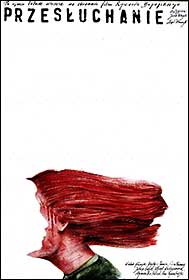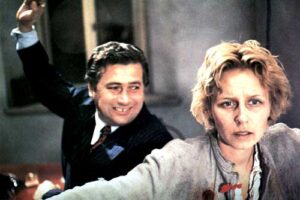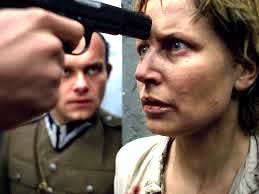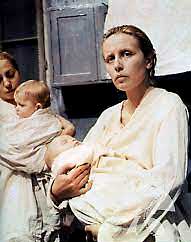This 1982 film has assumed legendary status in its native Poland, due in no small part to the fact that it was banned for several years. For American viewers the film’s allure is much simpler: it fits quite snugly into the Women in Prison subgenre, nearly all the particulars of which are given lip service. Certainly the politically-minded INTERROGATION (Przesluchanie), executive produced by Poland’s most prominent filmmaker Andrzej Wajda (1926-2016) and starring his favorite actress Krystyna Janda, exists on a plain elevated from those of THE BIG DOLL HOUSE (1971) and CHAINED HEAT (1983), but not by much.
The stated objectives of INTERROGATION’s director Ryszard Bugajski (1943-2019) were quite modest: “I just wanted to make a film for those who were tortured and killed by the communists.” Poland’s ruling party, however, viewed the film’s anti-Stalinist bent as subversive, and following the declaration of martial law in December 1981 censored it and forced Bugajski into exile (he ended up directing several episodes of the 1980s TWILIGHT ZONE and ALFRED HITCHCOCK PRESENTS reboots). The film remained under wraps until 1989, when it had its long belated premiere.
The setting is the late 1940s, and the protagonist a fun-loving showgirl named Tonia (Janda). One night she’s arrested for reasons that aren’t initially made clear and (in scenes that will feel very familiar to WIP fans) subjected to a humiliating strip search, prior to being thrown in a jail cell with several women (among them the acclaimed director Agnieszka Holland, chosen by Wajda to supervise the film and appearing onscreen because Bugajski had trouble filling out the cast). The following day she’s given a probing interrogation by Major Zawada (Janusz Gajos), who insists on posing sexually tinged questions and becomes enraged when Tonia doesn’t supply the answers he wants.
More interrogations follow, in which it’s revealed that the authorities’ primary interest is in a political dissident Tonia may have slept with. Asking the questions are Zawada and his colleague Morawski (Adam Ferency), who initially seems the more unpleasant of the two men. However, during one interrogation Morawski reveals he’s a holocaust survivor, and that his interest in Tonia goes beyond politics. He subsequently impregnates her but can’t admit he’s the father of the child, which literally drives him mad.
Tonia, meanwhile, has to endure all manner of torture, including assorted beatings and confinement in a tiny cell filled with freezing water. She finds brief solace in a lesbian affair with a cellmate (another WIP mainstay) but, after an unpleasant meeting with her husband, who’s swallowed the lies told about her by the authorities, tries to commit suicide by biting her wrist. The attempt fails and she ends up in a different cell, packed with cellmates who are even more unpleasant than those of her initial holding place.
Ryszard Bugajski’s naturalistic veneer, enhanced by the artful yet unobtrusive lighting of cinematographer Jacek Petrycki (EUROPA EUROPA), keeps all the mayhem from ever feeling sensationalistic. The non-violent scenes are equally well staged (aside from an overwrought scene with Tonia’s Olgierd Lukaszewicz played husband, who divulges that he hates her and wants a divorce) amid crumbling and decayed prison sets that convey a profoundly oppressive atmosphere.
The performance of Krystyna Janda is the film’s finest component. Hers is a fully convincing arc that takes Tonia from a carefree party girl to a world-weary middle aged woman (with Janda in the final scenes playing much older than she actually was), during which she’s made the recipient of onscreen brutality that looks disturbingly raw and unstaged.
Vital Statistics
INTERROGATION (Przesluchanie)
Zespól Filmowy “X”
Director: Ryszard Bugajski
Producer: Tadeusz Drewno
Screenplay: Ryszard Bugajski, Janusz Dymek
Cinematography: Jacek Petrycki
Editing: Katarzyna Maciejko-Kowalczyk
Cast: Krystyna Janda, Adam Ferency, Janusz Gajos, Agnieszka Holland, Anna Romantowska, Bozena Dykiel, Olgierd Lukaszewicz, Tomasz Dedek, Jan Jurewicz, Jaroslaw Kopaczewski, Zofia Balucka, Arkadiusz Bazak, Krzysztof Gosztyla, Antonina Girycz, O. Jasinska, Tomasz Lengren, Katarzyna Laniewska




